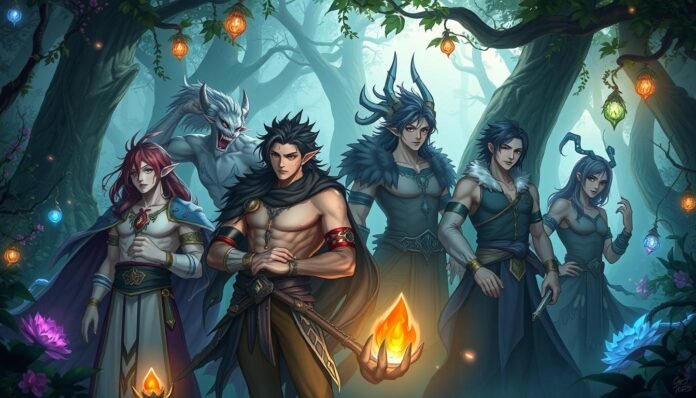Fantasy male names turn plain characters into unforgettable heroes. These names are powerful tools that bring fictional worlds to life.
Creating unique character names needs creativity and innovative thinking. These names introduce a character’s personality and background.
George R.R. Martin and J.R.R. Tolkien are masters of character naming. Their names can set up entire cultures in just one word.
Naming isn’t random. It involves understanding language roots and cultural details.
Good naming can make a story unforgettable. It adds depth to the character’s role.
Picking the right fantasy male names sets the stage. It creates an unforgettable story for readers to enjoy.
The Importance of Fantasy Male Names in Storytelling
Fantasy male names are powerful storytelling tools. They shape how readers understand and see characters.
A good name can show personality and background. It can add depth to the story.
Names are the first step in meeting characters. They open doors to who they might be.
Notable fantasy names can stir up feelings. They can hint at stories and make readers curious.
Names carry hidden meanings in stories. They can suggest traits, history, and roles.
“Aeron” sounds more mysterious than common names. It creates different hopes for the character’s journey.
Names can reflect different cultures in stories. They can take readers to new, exciting worlds.
They help build rich story settings. These settings feel real and pull readers in.
Top fantasy writers know names are key story tools. They pick names that fit character growth.
Good names hint at why characters do things. They stay in readers’ minds long after the story ends.
Origins of Fantasy Male Names
Fantasy male names come from rich cultural backgrounds. Mythological names inspire storytellers to create unique character identities.
Ancient civilizations offer linguistic origins for memorable characters. Norse mythology provides compelling examples of fantasy male names.
Names like Odin and Thor represent strength and leadership. Greek myths give us Perseus and Heracles, embodying heroic qualities.
Linguistic origins are key in creating authentic fantasy names. Celtic languages offer melodic sounds perfect for magical characters.
Gaelic names like Cian or Ronan have mystical undertones. They give characters depth beyond simple identification.
Cultural storytelling traditions worldwide contribute to name creation. Native American patterns offer rhythmic name structures.
Middle Eastern and African naming conventions add complexity. They help in building fantasy worlds.
Writers find endless possibilities in mythological names. Each name carries historical significance, linking fiction to ancient traditions.
Understanding these roots helps authors craft compelling stories. They create authentic fantasy narratives that captivate readers.
Tips for Creating Unique Fantasy Male Names
Fantasy male names need creativity and innovative thinking. Writers can learn powerful tips by exploring sound patterns.
Creative naming involves understanding syllables and phonetic structures. These elements help create memorable character identities.
Sound and rhythm are key in making great fantasy names. Writers should mix different syllable sounds and cultural linguistic patterns.
Unique phonetic combinations can create interesting names. “Kaelon” or “Zyrax” show how strategic sounds make intriguing names.
Digital name generators can inspire fantasy male names. These tools offer unexpected combinations that writers can change.
Fantasy authors often use generators as starting points. They then refine the names to fit their story world.
Cultural linguistics are rich resources for creative naming. Writers can draw from ancient languages and mythological references.
Understanding how cultures make names helps create authentic characters. This knowledge leads to more nuanced character identities.
Practical strategies for name creation include: – Mixing consonant and vowel sounds – Using unexpected letter combinations – Drawing from historical naming traditions – Considering character background and cultural context.
The main goal is to make names unique yet natural. Writers should listen to their names out loud.
This ensures the names sound organic and meaningful. The correct name fits perfectly in the story’s universe.
Popular Fantasy Male Names and Their Meanings
Fantasy male names blend linguistic creativity and cultural inspiration. They often come from myths, ancient languages, and imaginative stories.
Aragorn, from Tolkien’s works, shows how names can capture heroic essence. Kai means “sea” in Hawaiian, while Rowan comes from a Celtic tree name.
These names carry powerful symbolic meanings that readers love. Writers pick names to show character traits and story themes.
Nordic and Celtic traditions offer rich name meanings. Bjorn means “bear”, while Finn means “fair” or “white”.
Game of Thrones made many unique fantasy names popular. These names mix history with imagination.
Modern fantasy writers use names from beyond Europe. African, Asian, and indigenous naming traditions now inspire characters.
These diverse names add depth to fictional worlds. They make characters more vibrant and accurate.
Choosing a fantasy male name means understanding its origins and meaning. Readers and writers enjoy exploring names that bring characters to life.
How to Choose the Right Name for Your Character
Naming fantasy characters takes careful thought and creativity. A good name reveals hints about personality, background, and destiny.
Think about your character’s main traits when picking a name. A warrior needs a firm name that shows power.
A scholar might have a more complex name suggesting intelligence.
Cultural context matters in character naming. Look into naming traditions from different mythologies and historical periods.
Celtic, Norse and Arabic traditions offer great ideas for fantasy names. Avoid names that sound too much like existing characters.
Make sure the name is easy to say. Test it by reading it out loud.
A name that’s easy to pronounce helps readers connect with your character. The best names balance uniqueness and familiarity.
They should fit your fictional world but still be easy to understand. Trust your creativity when choosing a name.
Naming Conventions Across Different Cultures
Fantasy male names draw inspiration from diverse cultural naming traditions. These names dive deep into linguistic roots, giving characters meaning and authenticity.
Tolkien’s names are a prime example in fantasy literature. He created entire linguistic systems for his Elvish languages.
His approach changed how writers craft fantasy male names and introduced a new level of linguistic depth to fictional world-building.
Different cultures offer unique naming approaches. Nordic and Celtic cultures often embed ancestral stories within names.
Celtic naming conventions use patronymic structures. A son’s name often reflects his father’s name or lineage.
Viking-inspired fantasy names include elements of nature and heroic deeds. They also incorporate familial connections in their naming practices.
Japanese and Native American naming practices inspire fantasy male names, too. These traditions link names to personal traits and spiritual connections.
They also tie names to significant life events. Writers can use these rich cultural frameworks for character naming.
Understanding cultural naming conventions helps create authentic character identities. By studying global traditions, writers can develop names rooted in imagined worlds.
Mixing Realism with Fantasy in Naming
Fantasy male names need a mix of imagination and authenticity. Realistic names make characters relatable while keeping the story magical.
Study real-world naming patterns for inspiration. Add unique twists to hint at a character’s background.
Use root words from existing languages as a base. Combine different language elements to create distinctive yet familiar names.
Avoid overused fantasy naming patterns. Skip generic medieval names or hard-to-pronounce consonant combinations.
Craft names with natural rhythm and meaning. Reflect the character’s cultural context in their name.
The best fantasy names feel organic to their world. They blend creativity with cultural authenticity.
Resources for Finding Fantasy Male Names
Writers have many tools to find great fantasy male names. Online databases offer unique options for character naming.
Websites like Behind the Name help create imaginative names. Fantasy Name Generators also provide tools for fictional worlds.
Books are great for finding fantasy male names. Authors like Tolkien show interesting naming styles.
Folklore and myth collections have rich name ideas. These can spark creativity to build new worlds.
Digital tools make name creation easy for fantasy writers. Some apps let you search by culture or language.
Language websites have lots of name resources. They offer historical and cultural names for inspiration.
Writers suggest using different methods to find names. Mixing various sources can create memorable character names.
Final Thoughts on Fantasy Male Names
Fantasy male names breathe life into fictional worlds. Your creative naming turns characters into memorable legends.
Each name reveals the character’s depth and cultural background. It also shows narrative significance beyond ordinary storytelling.
World-building relies on picking fantasy male names wisely. Unique and meaningful names create immersive experiences for readers.
The best fantasy stories use authentic-sounding names. These names carry emotional weight and reflect imaginary landscapes.
Writers should see fantasy male names as character development tools. Research different languages and try new sound combinations.
Stay true to your created world’s internal logic. A good name can tell a lot about a character.
The creative naming journey is about discovery. Explore unexpected name origins and mix cultural influences.
Trust your storytelling instincts. Your unique approach will create unforgettable characters.
FAQ
Why are fantasy male names so important in storytelling?
Fantasy male names create immersive fictional worlds. They establish character identity and help readers connect with the characters.
A well-chosen name can convey personality and background. It makes your character more memorable and engaging.
How do I create a unique fantasy male name?
Combine linguistic elements and experiment with sound patterns. Draw inspiration from different cultures and avoid typical naming clichés.
Consider the character’s background and personality. Mix syllables and use unexpected consonant combinations.
What are some good sources of inspiration for fantasy male names?
Great sources include mythological texts and ancient languages. Historical records and cultural folklore can also inspire.
Authors often draw from Norse, Celtic, and Greek mythologies. Online name generators and fantasy literature can spark creativity.
How can I ensure my fantasy male name sounds believable?
Keep a consistent linguistic style. Avoid overly complex or unpronounceable combinations.
Make sure the name fits your fictional world. Say it out loud to test its readability.
Are there any naming conventions I should be aware of?
Different fantasy cultures have unique naming conventions. Tolkien’s Elvish names use soft consonants and melodic sounds.
Norse-inspired names tend to be more guttural. Research linguistic patterns of the culture you’re drawing from.
What are common mistakes to avoid when creating fantasy male names?
Avoid names that are too hard to say. Don’t rely on cliché naming patterns.
Steer clear of names that sound too similar. Choose names that match the character’s personality.
How important is the meaning behind a fantasy male name?
A name’s meaning can add depth to your character. Many authors choose names with symbolic meanings.
Not every name needs a profound meaning. However, etymology can create more nuanced characters.
Can I use real-world names in my fantasy setting?
Yes! Many fantasy authors adapt real-world names. Modify existing names to fit your fictional contexts.
Make sure the names match your fantasy world’s tone. This creates names that feel familiar yet unique.
you may also read: The Remarkable Story of Full Name: Understanding Its Significance

